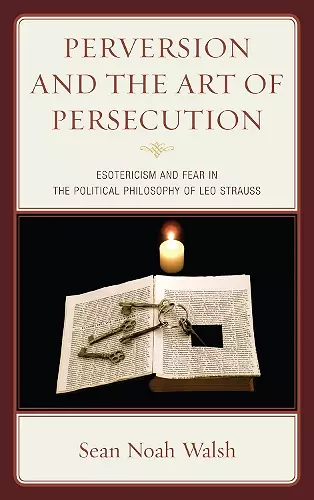Perversion and the Art of Persecution
Esotericism and Fear in the Political Philosophy of Leo Strauss
Format:Hardback
Publisher:Bloomsbury Publishing PLC
Published:8th Mar '12
Currently unavailable, and unfortunately no date known when it will be back

In this critical work on the political thought of Leo Strauss, Sean Noah Walsh addresses Leo Strauss’s claims about esotericism in the philosophic texts of Plato. He challenges Strauss’s understanding of esoteric writing as an attempt by Plato to secretly encode the highest truths “exclusively between the lines” in order to avoid persecution. Indeed, through the character of Socrates, the speaker with whom Plato is inextricably associated, Walsh asserts that Plato’s exoteric writings were sufficiently incendiary and provocative to demonstrate that a fear of persecution was not his highest priority. The politics that follow from Strauss’s thought depend on the interpretation of these Platonic philosophical bases and by analyzing how the problem of fear has been confronted in the works of Plato and Leo Strauss, Walsh offers a direct and thorough account of the politics that emerge from Strauss’s esoteric reading of political philosophy.
Applying Lacanian psychoanalysis, Walsh investigates the discourse of Straussian esotericism. and examines Plato’s writing for examples of exoteric risk, subjecting both Plato and Strauss’s writings to Lacan's psychoanalytic technique for interpreting the function of desire in discourse. Given the continuing influence of Strauss’s ideas on contemporary politics, particularly within American foreign policy, Walsh’s examination of this Straussian esotericism for these effects will prove an interesting read for political theorists, international relations scholars, and philosophers alike.
Perversion and the Art of Persecution: Esotericism and Fear in the Political Philosophy of Leo Strauss makes an important contribution to the larger field of political philosophy and speaks to Strauss’s perversion regarding writing due to his fear. Ultimately, its merits lie in the questions that it raises and the trenchant and poetic insight about the role of the political philosopher in political life with which he leaves the careful reader. Indeed, the whole book generates a dialogue and critical examination about our role as political philosophers and political beings. Walsh’s book unfolds in front of us as the ‘barb of the Platonic gadfly endur[ing] to sting again and again.’ -- Anna M. Agathangelou, York University, Toronto
ISBN: 9780739171806
Dimensions: 236mm x 161mm x 19mm
Weight: 449g
192 pages